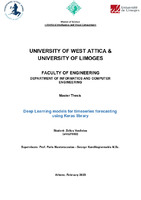| dc.contributor.advisor | Μαστοροκώστας, Πάρις | |
| dc.contributor.advisor | Κανδηλογιαννάκης, Γεώργιος | |
| dc.contributor.author | Ζέλιος, Βασίλης | |
| dc.date.accessioned | 2023-03-02T10:58:26Z | |
| dc.date.available | 2023-03-02T10:58:26Z | |
| dc.date.issued | 2023-02-15 | |
| dc.identifier.uri | https://polynoe.lib.uniwa.gr/xmlui/handle/11400/3781 | |
| dc.identifier.uri | http://dx.doi.org/10.26265/polynoe-3621 | |
| dc.description.abstract | The current thesis aims to conduct a thorough examination of recurrent neural networks for the purpose of forecasting short-term electric load in Greece. The study is motivated by the significant energy crisis that Greece has been experiencing, which is characterized by high electricity costs. As of January 2022, Greece had the highest electricity costs in Europe, reaching 227.3 Euros per megawatt-hour. This dire situation necessitates the development of accurate forecasting methods for electric load demand by experts.
Recurrent neural networks are a type of artificial neural network that have the ability to process sequential data, making them suitable for time series forecasting. The study explores the impact of different network architectures and parameters on the forecasting performance.
We developed deep learning algorithms using Python and trained neural networks with historical data to generate predicted electricity load values and calculate statistical errors. The focus of the study was on using LSTM models, which have been shown to provide highly accurate forecasts for time series data due to their complexity.
In conclusion, the predictions generated by the models developed in the present study were integrated into the Power BI platform, to facilitate the ease and convenience of data visualization for the end-user. Power BI is a business
intelligence tool that allows for the creation of interactive visualizations and dashboards, providing a user-friendly interface for data exploration. By integrating the model predictions into Power BI, it becomes possible to present the data in an intuitive and accessible manner, enabling the end-user to gain insights and make informed decisions. | el |
| dc.format.extent | 89 | el |
| dc.language.iso | en | el |
| dc.publisher | Πανεπιστήμιο Δυτικής Αττικής | el |
| dc.publisher | Université de Limoges | el |
| dc.rights | Αναφορά Δημιουργού - Μη Εμπορική Χρήση - Παρόμοια Διανομή 4.0 Διεθνές | * |
| dc.rights | Attribution-NonCommercial-NoDerivatives 4.0 Διεθνές | * |
| dc.rights | Attribution-NonCommercial-NoDerivatives 4.0 Διεθνές | * |
| dc.rights.uri | http://creativecommons.org/licenses/by-nc-nd/4.0/ | * |
| dc.subject | Electric load demand | el |
| dc.subject | Recurrent neural networks | el |
| dc.subject | Deep learning | el |
| dc.subject | Time-series forecasting | el |
| dc.subject | Short-term forecast | el |
| dc.subject | Algorithms | el |
| dc.subject | Python | el |
| dc.subject | Visualization | el |
| dc.title | Deep learning models for timeseries forecasting using Keras library | el |
| dc.title.alternative | Μοντέλα βαθιάς μάθησης για πρόβλεψη χρονοσειρών χρησιμοποιώντας τη βιβλιοθήκη Keras | el |
| dc.type | Μεταπτυχιακή διπλωματική εργασία | el |
| dc.contributor.committee | Κεσίδης, Αναστάσιος | |
| dc.contributor.committee | Tselenti, Panagiota | |
| dc.contributor.faculty | Σχολή Μηχανικών | el |
| dc.contributor.department | Τμήμα Μηχανικών Πληροφορικής και Υπολογιστών | el |
| dc.contributor.department | Τμήμα Μηχανικών Τοπογραφίας και Γεωπληροφορικής | el |
| dc.contributor.master | Τεχνητή Νοημοσύνη και Οπτική Υπολογιστική | el |



